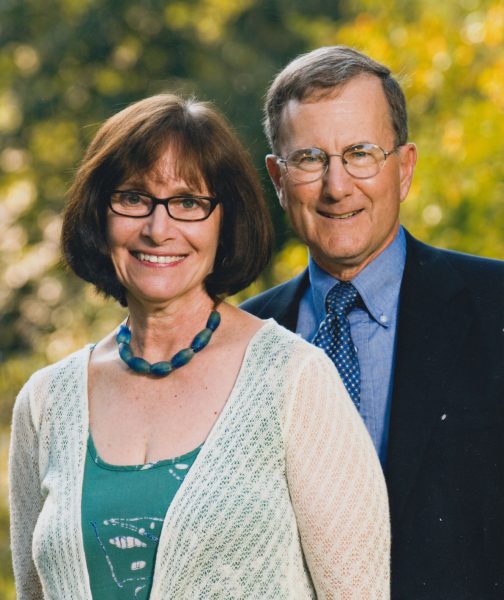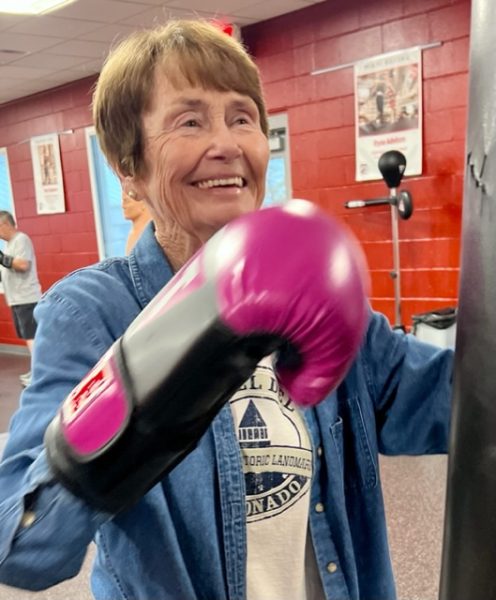The Rock Steady Boxing Program, a boxing class for people with Parkinson’s disease, held its last session in Oxford on Friday, Oct. 27. The program was shut down due to financial difficulties of its main sponsor, Reid Hospital in Richmond.
Sara Penhale, a retired biology professor at Earlham College, and her husband Allan Winkler, a retired Miami history professor, brought the boxing program to Oxford about two years ago.
“I like the classes, and I like the people,” Penhale said. “I wouldn’t be getting much exercise without it, so I’m much more fit than I would be otherwise.”
Rock Steady Boxing is a national organization headquartered in Indianapolis, Winkler said. The Oxford branch was affiliated with Reid Hospital. The hospital has recently experienced financial issues and couldn’t sustain the amount of trainers, he said. Because of these conditions, the branch had to close.

Penhale has been diagnosed with Parkinson’s disease, a progressive disease that damages the nervous system, for 17 years. According to the National Institute on Aging, Parkinson’s is a brain disorder that can cause uncontrollable movements such as shaking, which gradually worsen over time. Symptoms may include difficulty walking and talking.
Penhale said that while for her, medications don’t help, exercises such as boxing do. It is the current treatment for Parkinson’s, she said.
“It’s pretty impressive to watch the way they move people around using boxing,” Winkler said.
During the classes, participants practice by hitting bags and never eachother.
Tari Tharp, a retired children’s librarian at Lane Library and participant of the Rock Steady program, said the classes provide community, as the group encourages each other and shares the connection of fighting the same disease.
Boxing classes provide exercises that require multitasking, memory and using your voice, which has helped her grow in balance, strength and agility, Tharp said.
“There have been times when an exercise was introduced and my initial thought was, ‘I can’t do that!” Tharp wrote in an email. “Usually though, I could do it or at least was successful in accomplishing more than I anticipated.”
While most people are aware of the physical effects the disease has, fewer people know about the cognitive impact that happens due to lack of dopamine in the brain, said Steve Gifford, who was diagnosed with Parkinson’s 17 years ago. His two children are in active duty in the armed forces.
“For some, it can be the most debilitating part of the disease, even more so than the physical aspects,” Gifford said.
Boxing helps with both the physical and cognitive effects of Parkinson’s disease, he said.

To restart the Oxford branch of Rock Steady, Winkler said that he and Penhale will have to find a head coach. They currently have a person interested in the position but can’t confidently confirm if the position has been filled.
“Basically, we need a coach, a structure and funding,” Penhale said.
The program also needs permission from Miami University to continue holding the classes at the Chestnut Field House and apply for grants to help with funding. Winkler and Penhale said that as of right now, they are looking to the Oxford Community Foundation, Oxford Museum Association and the McCullough-Hyde Foundation for financial support.
Miami’s Anatomy and Physiology club also expressed interest in collaborating with Rock Steady to learn more about Parkinson’s Disease in past years, and the Oxford branch is hoping to continue this relationship.
“We want people to know about it so we can maintain a constant population of people interested to keep it going,” Winkler said.
Winkler estimated the program could be running again in the next two to six months. The goal is to have classes started in the early spring, he said.
Penhale and other participants now travel to Rock Steady Boxing sessions in Richmond.
“The closure of the Oxford classes is very distressing,” Tharp said.
She said traveling to Indiana for classes is inconvenient, time-consuming and not sustainable.
Rock Steady Boxing participant Susan Bartow said it’s important for people to know how well the program works to meet physical, social and cognitive needs for the people involved.
“Because it is just for people with Parkinsons, working out together also gives us a deep sense of camaraderie,” Bartow said. “We’re from very different walks of life but care deeply for each other’s challenges and victories.”
Penhale also started a support group for people with Parkinson’s disease in Oxford. The group meets once a month at Oxford Bible Fellowship.







